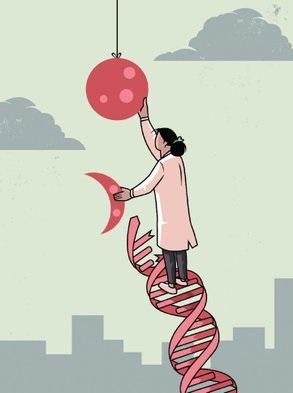DISCLAIMER
The information and materials accessed through or made available for use on any of our Sites, including, any information about diseases, conditions, treatments, or medicines, are for informational purposes only. The Content is not intended to be and is not a substitute for professional medical advice, diagnosis, or treatment, and your participation on our Sites does not create a healthcare professional-patient relationship. You should consult a doctor or other qualified health care professional regarding any questions you have about your health or before making any decisions related to your health or wellness. Call your doctor or 911 immediately if you think you may have a medical emergency.compose your message
message sent
email sent successfully
Trusted Resources: News & Events
Latest announcements and gatherings
Genetic Treatments for Sickle Cell
For decades physicians have known that a few children like Ceniya have unusual genetic mutations that counteract the effects of the sickle-cell flaw. Researchers would like to re-create their uncommon physiology in everyone with sickle-cell anemia. Though not technically a cure, the compensatory treatment would spare many of the 300,000 infants around the world who are born every year with sickle cell and who often do not live beyond childhood. It would also make life a lot easier for the more than 70,000 individuals living with the disease in the U.S., who, despite treatment that mitigates some of the most serious effects of the condition, often die in their 40s.
Investigators are now beginning to test such approaches, which depend on the precise alteration, or editing, of certain genes using new techniques in genetic engineering. (As will be addressed shortly, providing the compensatory mechanism should be easier to achieve than fixing the original sickle-cell genetic defect.)

 +myBinder
+myBinderRelated Content
-
videos & visualsIsaac Singleton: Sickle Cell Freehttps://www.youtube.com/watch?v=a5mMgnuz...
-
videos & visualsNew digital education platform for the SCD communityhttps://www.onescdvoice.com/wp-content/u...
-
news & eventsSCD Patients Receiving Hydroxyurea in the U.S. Still Face Many ChallengesPeople with sickle cell disease (SCD) tr...
-
videos & visualsSickle Cell Disease Factshttps://static.wixstatic.com/media/c7814...
-
education & researchSustainability of Hematological and Clinical Benefits to HU Administration in the Prevention of Sickle-Cell Vaso-Occ...Hydroxyurea (HU) is approved in EU and U...
-
education & researchDoes sickle cell disease increase risk of adverse outcomes following total hip and knee arthroplasty? A nationwide d...Sickle cell disease (SCD) is associated ...
-
news & eventsGene-Edited ‘Supercells’ Make Progress In Fight Against Sickle Cell DiseaseDoctors are reporting the first evidence...
send a message
To improve your experience on this site, we use cookies. This includes cookies essential for the basic functioning of our website, cookies for analytics purposes, and cookies enabling us to personalize site content. By clicking on 'Accept' or any content on this site, you agree that cookies can be placed. You may adjust your browser's cookie settings to suit your preferences. More Information
The cookie settings on this website are set to "allow cookies" to give you the best browsing experience possible. If you continue to use this website without changing your cookie settings or you click "Accept" below then you are consenting to this.
Support for this site is provided by

This platform is made possible through a partnership with the Sickle Cell Disease Association of America, Inc. (SCDAA) and its member organizations. SCDAA's mission is to advocate for people affected by sickle cell conditions and empower community-based organizations to maximize quality of life and raise public consciousness while advancing the search for a universal cure.




